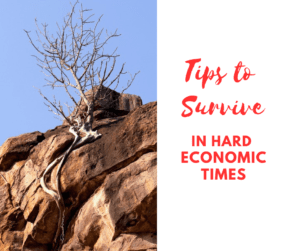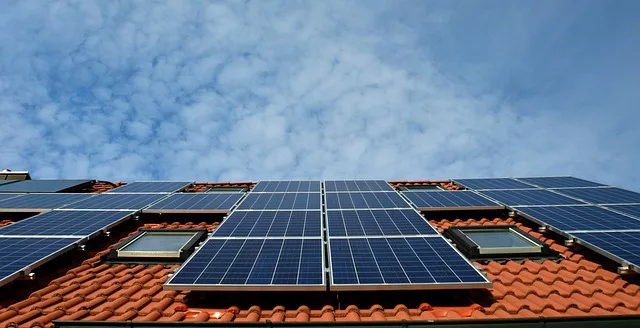Surviving in tough economic times has become a daunting challenge in Kenya, where commodities price fluctuations significantly impact individuals and households.
However, do you know that with careful planning and a resilient mindset, you can navigate through these challenging times and emerge stronger? Well, in this article, we will explore practical tips to survive in hard economic times in Kenya.
If you implement these strategies, you will gain better control over your finances, adapt to changing circumstances, and build a more secure future for your family.
Let’s explore the key principles and actions that can help you achieve financial stability in Kenya’s difficult economic times.
Subscribe to our email list to receive more actionable ways to make money through businesses.

Tips To Survive in Hard Economic Times in Kenya
1. Budget wisely
Create a budget to track your income and expenses and prioritize essential spending. A budget helps you know what you do with your monthly income. Budgeting is also a great way to help you cut unnecessary expenses.
In these hard economic times in Kenya, you should strive to budget for essential needs only. For instance, prioritize your food, house rent, healthcare, and education until we have better economic times in the future.
In addition, learn to do your shopping either weekly or monthly to make it possible to monitor your spending. You can also shop in wholesale stores when buying in bulk and you will eventually save some coins.
2. Cut unnecessary expenses
You should reduce spending on non-essential items and focus on meeting basic needs. This will help you ensure you are doing well on a daily basis. Spending on the newest outfit in town is mostly a wrong financial move in these tough economic times in Kenya.
You can also cut unnecessary expenses by reducing the items that need lots of running costs. For instance, your house help can wash your clothes instead of using a washing machine. This idea will help save on electricity.
After all, you must pay your helper at the end of each month. Alternatively, if the house chores are manageable, you can do away with the house help and do the duties yourself.
3. Save money, save items and services
We don’t know how long the economy will be jeopardized. Therefore, save regularly to build an emergency fund, even if it’s small. Cutting unnecessary expenses will help you save some coins.
You should monitor your daily spending and plan how to spend the days in between your salary. It would be great if you found ways to use cheaper things that serve your purpose.
For instance, you can soak cereals in water before cooking them. You can also opt to have a kitchen garden that will allow you to save on groceries. This idea will help you save on fuel and time for cooking the cereals.
You should also do your shopping in bulk to get discounts and reduce the stress of cooking late and sleeping late.
In addition, maximize expenses that bring more money into your pocket. For instance, since I’m a blogger, I get my monthly internet subscriptions on time because that helps me earn money.
To save on usage and money, I usually subscribe to the 30-day Bazu bundles on Airtel. I prefer bundles over Wi-fi because I move a lot. And that helps me save money on buying bundles whenever I’m not at my workstation.
Therefore, you need to adapt ways of saving money to survive in hard economic times in Kenya.
4. Diversify income sources to survive in hard economic times in Kenya
Diversification seems the best way to prepare and survive in hard economic times in Kenya or any other place globally. Therefore, you should explore additional ways to earn money, such as freelancing or starting a small business.
You should upgrade your skills and knowledge to enhance employability or entrepreneurial prospects. For instance, I opted to learn about freelance writing and blogging in 2021, and it’s now paying my bills. In the same way, you can learn a skill you can use to make more money on the side.
5. Embrace frugality to survive in hard economic times in Kenya
We say that desperate times call for desperate actions. And that will keep you afloat in these tough economic times in Kenya. Think of ways you can implement to save on food and money.
For instance, you can cook enough food to avoid wasting excess food if it goes bad. However, you can cook cereal and eat the remainder during breakfast. In addition, you can pack your lunch to work and save Ksh 50-200, depending on your work location.
If your workplace is close enough, you can walk or buy a bicycle and ride to work. That way, you will save on transport and still exercise daily to stay physically fit.
Adopt a frugal lifestyle by saving money on daily expenses and seeking affordable alternatives.
6. Seek government/NGOs support
During tough times in Kenya, especially in drought-resistant areas like Eastern and Northern Kenya, the government and other Non-government Organisations (NGOs) offer support. The support is usually in foodstuffs, water supply, and clothing which help the residents survive in Kenya’s hard economic times.
If you reside in those areas, you should stay alert and take advantage of government assistance programs or initiatives available during tough times. That will help you stay on your toes as the tough times end.
7. Network and collaborate to survive in hard economic times in Kenya
During tough times, you should build a strong support network with like-minded individuals who can provide guidance and potential opportunities. For instance, you can join social media groups that offer guidance and tips on surviving the tough times in the region.
These groups also help you to know areas to get cheap and high-quality products and services in Kenya. For instance, the 52 Week Saving Challenge group on Facebook has many insights on survival, business ideas, and saving strategies.
8. Manage debt carefully
Have you ever heard of living within your means? Well, you can live within your means if you minimize debts and embrace cutting costs to fit your earning potential. During these tough economic times in Kenya, you should minimize using credit cards and loans, focus on paying off existing debts, and avoid taking on new ones.
However, you don’t have to starve in the name of living debt free life. Instead, you can organize with your lender to reschedule and revise your payments to a more convenient period. In addition, when paying off debts, prioritize the debts with very high interest rates like the mobile app loans, which can lead to an endless debt trap.
9. Negotiate bills to survive in hard economic times in Kenya
You should contact service providers to negotiate better rates or payment plans to reduce monthly expenses. In addition, you should window-shop around for the products or services you need to ensure you get better rates. For instance, choose an internet provider with cheap and reliable monthly subscriptions.
10. Seek affordable alternatives to survive in hard economic times in Kenya
To survive in hard economic times in Kenya, you should look for cheaper options for essential items and services without compromising quality. For instance, instead of buying products from supermarkets with fixed price tags. Instead, you can buy at wholesale and retail shops where you can negotiate.
If you want to buy farm produce like cereals and vegetables, you can buy cereals from nearby farmers, where you’ll get cheaper than retail stores. If possible, plant a small kitchen garden to cater to your daily vegetables. The good thing is that you’ll consume fresh vegetables you know about their production.
11. Energy conservation
In these hard economic times in Kenya, you should conserve energy by turning off lights and appliances when not in use to reduce utility bills.
You can also opt for natural energy like Biogas for cooking and lighting. Furthermore, Solar energy is also a great option to save on electricity. You only need to set up your solar system and do planned maintenance after a few years.

12. Share resources to survive in hard economic times in Kenya
Consider sharing expenses with trusted friends or family members to reduce costs. For instance, if you use Wi-fi at your home, consider sharing with your neighbors at a cost. That will help you save some coins on monthly expenses.
13. Utilise public transportation to survive in hard economic times in Kenya
Fuel prices have been increasing over the last few years, which has caused a high rise in all commodities in Kenya. If you have a personal car, you can opt to use public transportation when feasible to save on fuel and vehicle maintenance expenses.
14. Focus on preventive healthcare
Do you know that you can prevent most diseases through a healthy lifestyle? For instance, you should focus on eating healthy and balanced diets to prevent chronic diseases such as cancer, diabetes, hypertension, etc.
If you maintain good health, you will avoid costly medical expenses.
Alternatively, you can get insurance for your family to reduce medical expenses in case anyone gets sick. The good thing is that the Social Health Authority (SHA) can help you at any hospital in Kenya with both Inpatient and Outpatient services.
15. Research financial decisions
It’s good to invest your money to make profits or return on investment. However, it’s very important to conduct thorough research and seek professional advice before making significant financial decisions.
For instance, ensure you do due diligence before investing in the Kenyan property market to avoid losing your money to cons.
Again, when investing in digital assets such as cryptocurrency, don’t hesitate to research before you lose your money. The same applies to when you want to start a business in Kenya. You should research what you will gain or lose in the business.
16. Access free resources
The internet is full of free resources where you can access information on almost everything you want to know. Before I started writing, I took advantage of free online courses until I learned my craft. You, too, can take advantage of free resources available online or in the community, such as educational courses or public libraries.
You can survive the hard economic times in Kenya if you have a super skill to make money. The good thing is you can learn for free using the Internet.
17. Embrace DIY to survive in hard economic times in Kenya

In these harsh economic times when commodity prices are skyrocketing, you should learn basic do-it-yourself skills for minor repairs and maintenance to save money on hiring professionals.
The good thing is you can find DIY lessons through YouTube Tutorials for free (just the expense of your internet).
18. Explore income-generating opportunities
You should look for income-generating activities like renting out unused space or providing services within your skills.
For instance, you can provide consultation on what you are good at. Suppose you run a successful cereal business. You can offer consultation services at a fee to those willing to succeed in the same business in Kenya.
The good thing about the consultancy business is you can reach a global audience through social media and blogging.
19. Support local businesses
We say, buy Kenya, build Kenya. Therefore, you should prioritize buying from local businesses and artisans to support the local economy.
Supporting local businesses can help create employment, and fewer people will need help during tough economic times in the country.
20. Stay informed to survive in hard economic times in Kenya
Keep up with current events, economic trends, and government policies that may impact your financial situation.
A good way to stay informed is by passing by social channels like X and TikTok to keep track of what’s happening around you. However, you should be vigilant not to consume fake news.
You can follow the Newsrooms on their social media accounts, where they update what’s happening, and you will be assured of accurate information.
For instance, I rarely watch the news on our television. Instead, when browsing on Facebook or Twitter, I also get to know what’s happening in Kenya and abroad. So I save time watching the news on TV since I can see them even while traveling.
21. Practise good financial management
You’ll agree with me that most people are suffering due to poor financial management skills. I regret that the Kenyan curriculum, or any other country, is unwilling to teach anyone about financial management.
I wish that there could be money lessons from primary, secondary, and tertiary education. That will help create a money-responsible generation that can generate solutions regardless of economic status.
However, because the school doesn’t have such lessons, you’ll get the lessons on the streets. You can buy books that help you make sober financial decisions.
I often talk about a book that changed my life, The Parable of the Pipeline by Burke Hedges. It helped me create an income pipeline through blogging and other passive income businesses.
As part of giving back to the community, I have Authored a book to help you gain financial freedom. WhatsApp us at +254748628107 to get the book at Ksh. 400.
22. Maintain a positive mindset to survive in hard economic times in Kenya

I would say that you can solve most of your troubles by changing your mindset. You can build a positive mindset by reading books to cultivate your thinking potential. I also have authored a book, The Growth Mindset, that shows you how you can overcome all negativity around you. WhatsApp us at +254748628107 to get the book at Ksh. 400. These books can help you stay optimistic and resilient in the face of challenges and focus on finding growth opportunities.
Furthermore, in these hard economic times in Kenya, you should control what you see or hear since that’s one way to have a positive or a negative mindset.
23. Stay connected with your community
We say, to go fast, you should walk alone, but to reach far, you should walk with a team. Therefore, you should engage with your community and support each other through sharing resources, skills, and knowledge.
A strong team with like-minded people can help build a strong fallback for any member in times of trouble. Engage in chamas that support each other during merry and uncertainties such as death or sickness.
24. Stay mentally and physically healthy
In these tough economic times in Kenya, you should prioritize self-care, stress management, and a balanced lifestyle to cope with challenging times. Otherwise, you will not cope with commodity prices and health issues at once.
25. Keep learning and adapting
Stay open to learning new skills, adapting to changing circumstances, and seeking personal and professional growth opportunities. Take courses, free or paid, that help you grow your career.
Furthermore, ensure you are at par with technology to help your skills stay relevant for as long as possible. Otherwise, you don’t want to lose your job to a robot in the future.
The Bottom Line
It’s time to use the term ‘survival for the fittest in Kenya. However, you better adapt to the survival tactics in this article to survive in tough economic times in Kenya. Who knows, times might get better as we stay strong.
Get the Books: Financial Freedom Simplified and The Growth Mindset by sending us a Message at WhatsApp +254748628107.
Good luck!

